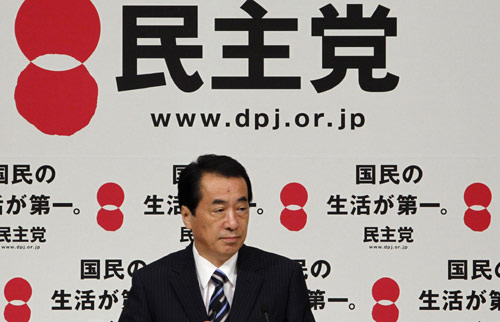View
Kan's challenges
(China Daily)
Updated: 2010-09-16 07:48
 |
Large Medium Small |
 |
|
Japan's Prime Minister Naoto Kan speaks to the media after winning the Democratic Party of Japan party leadership vote at a news conference in Tokyo September 14, 2010. [Photo/Agencies] |
Japanese Prime Minister Naoto Kan survived a leadership vote on Sept 14 to remain as the country's leader. But he will face formidable challenges from national problems and a major diplomatic row with China.
Before Kan's big-margin victory over powerbroker Ichiro Ozawa in the leadership election of the ruling Democratic Party of Japan (DPJ), both Kan and Ozawa talked tough on territorial disputes with China.
What Kan voiced in the recent election was not totally in line with what his party has held in the past. Yet the prime minister is expected to come up with clearer expressions on the continued illegal detention of the Chinese trawler captain, who is at the center of the recent diplomatic row between the two countries involving the Diaoyu Islands.
Keeping a stable relationship with China seems to be posing a challenge to the Japanese prime minister. The longer the diplomatic friction over the detention of the Chinese trawler captain continues, the lesser the opportunity for Kan to fix the already impaired relations.
Apparently, during the recent party election, Kan and Ozawa had no useful chips in domestic affairs to gain support and had to resort to foreign affairs as the last straw. Now that Kan has secured his prime minister's job, he should avoid a major slide in bilateral ties with China.
Japan's tough stance over the trawler incident has already backfired. The Chinese government has lodged strong protests one after another. Last week, it postponed a negotiation with Japan on the East China Sea issue scheduled for mid September. The negotiation was seen as a sign of positive development in bilateral ties.
On Sept 14, the Foreign Ministry announced that a delegation of the National People's Congress, China's parliament, had agreed to postpone a scheduled visit to Japan.
Public fury over Japan's illegal detention has also flared up. Netizens are reminded of Japanese rightists' unwillingness to acknowledge and apologize for Japan's wartime atrocities against the Chinese and peoples in other Asian nations.
China has irrefutable historical records showing that the Diaoyu Islands have been part of its territory since ancient times. As the boat of Zhan Qixiong was fishing in Chinese territory, Japan should stop the so-called "legal procedures" against the Chinese national kept by its forces. Zhan should be returned home unconditionally and immediately.
Japan should understand that Beijing will never back off from its current position for territorial integrity.
As for the Japanese economy, instability in Japan's political scene in the past few years has partly contributed to its economic stagnation and intensified social discontent. In a way, whether the global economic power shows positive signs in economic recovery in the near future may hinge on Kan's ability to cling to power for a longer time.
Kan has to demonstrate strong political will as well as prove his ability to unite the ruling party and prescribe effective remedies for the dormant economy. He has to deliver the promises his party made when it was elected to power about a year ago - to create jobs and strengthen social welfare.
And Kan should make a wise political move and defuse the tension over the Chinese trawler as soon as possible.